Photographs: Cynthia Karam/Reuters. Vrishti Beniwal
With import duty on gold raised to 8 per cent, smugglers are back at work. Vrishti Beniwal reports on the novel ways in which the yellow metal is being illegally brought into the country.
In June, a traveller named Abdul Sattar aroused the suspicion of customs officers at the Indira Gandhi International Airport in New Delhi.
The three cardboard boxes that he had brought along had an unusually high number of stapler pins - 109 in all, to be precise.
Though they were painted grey, it took the officers little time to realise they were made of gold.
Weighing 6 grams each, the pins were 754 grams of gold, worth Rs 20 lakh. In another incident, a counselor-level diplomat travelling from Dubai was nabbed at the Delhi airport carrying 37 kg of jewellery worth Rs 10 crore (Rs 100 million).
When asked to open his bags, he invoked diplomatic immunity. However, the bags were searched and gold was seized after the Directorate of Revenue Intelligence (DRI) issued search orders.
...
How gold is smuggled into India
Image: Gold bangles are on display at the international Istanbul jewellery fair in Turkey.Photographs: Murad Sezer/Reuters
The diplomat and an Indian passenger accompanying him were detained, but not arrested. The external affairs ministry decided to deport the diplomat.
The ghost of Haji Mastan has returned to haunt Indian customs and DRI officers. The Mumbai gangster made pots of money by smuggling gold into the country from West Asia, mostly by sea, in an era when gold could not be imported.
Mastan (1926-1994) was as much a popular figure as a criminal. He would always be seen dressed nattily, with a pack of expensive cigarettes in his hand, and travel in his white Mercedes.
He would hobnob with the stars, and starlets, of filmdom. In his later years, Mastan claimed he had fully reformed and had nothing to do with any illegal activity.
…
Booming business: How gold is smuggled into India
Image: A woman checks a gold waist belt inside a jewellery shop in Hyderabad.Photographs: Krishnendu Halder/Reuters
In any case, gold smuggling was dealt a death blow when imports were liberalised in the early 1990s. That is, till a few months back.
Indians have for centuries been obsessed with gold. Economist John Maynard Keynes had in 1913 talked about the “needless accumulation of gold by Indians”, calling it an “uncivilised and wasteful habit”.
In 1958, then Reserve Bank of India Governor IG Patel had called for the need to dethrone gold “from the position it occupies”.
Over half a century later, the obsession has only got worse - India remains the largest consumer of gold in the world. As the country hardly produces any gold, most of it is imported.
This has worsened India’s trade deficit and caused the rupee to fall steeply against the dollar. To curb the demand, the finance ministry steadily raised the import duty on gold from 1 per cent to 6 per cent. But that didn’t stem the flow.
Then, in June this year, the duty was bumped up to 8 per cent. That proved to be the tipping point. Gold smugglers returned from the dead.
…
Booming business: How gold is smuggled into India
Image: A goldsmith poses with gold bangles in his jewellery shop.Photographs: Ali Jarekji/Reuters
Gold imports crashed from 162 tonnes in May to about 31 tonnes in June. It is believed that much of it now comes from the illegal channel.
In the April-June quarter of this financial year, seizure of smuggled gold hit Rs 59.82 crore (Rs 598.2 million) - an increase of 365 per cent over the same period a year ago.
Seizures in 2012-13 had doubled from the previous year to Rs 99.34 crore (Rs 993.4 million). This year, authorities expect this to rise to around Rs 250 crore (Rs 2.5 billion).
The vigil at all airports, especially those which host flights originating from West Asia, has been stepped up.
A prolonged battle of wits is on the cards because the finance ministry has no plan to roll back the import duty, thanks to the worrisome trade deficit.
…
Booming business: How gold is smuggled into India
Image: Gold bars and jewellery are displayed in a shopPhotographs: Sukree Sukplang/Reuters
Haji Mastan was the master of the Arabian Sea. Dhows would bring gold from West Asia, dump it at secluded spots, and Mastan would warehouse it. This time around, the modus operandi of smugglers has undergone a ‘sea’ change.
These days, smugglers prefer the air route and to some extent the land route (about 10 per cent of the smuggled gold is coming overland from Nepal and Bangladesh; that’s why it is suspected that gold sells cheaper in towns like Gorakhpur that are close to the Nepal border).
Sea routes were more lucrative earlier as one could bring 20-30 kg of gold at a time. It’s not feasible in current times when things change at the drop of a hat.
A boat (small enough to escape the attention of the Coast Guard) takes about one month to reach India from West Asia, and in this time anything could happen - there could be a drop in gold prices in India or the duty rate could change, making it a risky preposition.
…
Booming business: How gold is smuggled into India
Image: A jewellery store displaying a hawk-shaped golden figurine.Photographs: Bobby Yip/Reuters
However, the sea route is still used by fishermen coming from Sri Lanka. A few weeks ago, a fishing boat from Sri Lanka landed at Kodikkarai in Tamil Nadu with gold bars weighing 40 pounds (over 18 kg).
The gold was to be sold in nearby Chennai. Two separate vehicles carrying the gold to Chennai were intercepted at Shirkazhi in the Nagapattinam district and Thiruthuraipoondi in the Tiruvarur district.
The seized gold biscuits had the seal of a Swiss bank. Five people, including a local politician, were arrested. They were offered a commission of Rs 3 lakh to carry the gold bars to Chennai.
A large portion of the gold is now smuggled into India by human carriers in flights from West Asia. Most of the carriers are either poor people who agree to smuggle the gold in small quantities (2 to 4 kg) for a commission or Indian labourers who are happy just to get their trip back home sponsored.
…
Booming business: How gold is smuggled into India
Image: A temporary tattoo design made of gold leaf is placed on a customer's arm at a jewellery shop.Photographs: Jumana El-Heloueh/Reuters
“Somebody at the airport in Dubai would give them the gold and another person at the airport in India would collect the parcel. The carrier doesn’t know anything about the sender or the receiver. It becomes difficult to catch the people working behind the scenes,” says a chief commissioner with the customs department.
For a carrier there is not much at stake if he is nabbed by the customs authorities at the airport. One, the authorities cannot arrest a person if the seized gold is worth less than Rs 50 lakh, which would be around 2 kg.
Two, if he is arrested the person can come out on bail in a matter of days. And three, even if a person is booked, the punishment given by courts in such cases is imprisonment up to one year, though there is provision of up to seven years of imprisonment under the law.
…
Booming business: How gold is smuggled into India
Image: A worker scoops gold shots at Japanese jewellery brand, Ginza Tanaka's original equipment manufacturer (OEM) factory in the Chiba prefecture, east of Tokyo.Photographs: Yuriko Nakao/Reuters
Penalty can be four to five times of the seized value but normally only 20-30 per cent is levied. Smugglers get the seized gold picked up by paying the penalty. If not claimed by anybody, the gold is auctioned off.
The government may now start imposing higher penalty to instil fear in smugglers. About 50 people have been arrested so far for gold smuggling this year.
The cost involved in smuggling includes commission of the carrier (about Rs 20,000 on an average), return airfare, boarding and lodging expense for two nights and some miscellaneous expenses.
Back-of-the-envelope calculations suggest that these expenses amount to nearly Rs 1 lakh. If the international price of gold is Rs 25 lakh per kg, with 8 per cent customs duty it will cost Rs 27 lakh in India if brought in legally.
…
Booming business: How gold is smuggled into India
Photographs: Jo Yong-Hak/Reuters
The current price of gold is Rs 28 lakh per kg; if the smuggler sells it at Rs 27 lakh a kg, he stands to make Rs 1 lakh after deducting the carrier’s expense. So, it makes sense to load the carrier with as much gold as possible.
If the money is repatriated through hawala , the illegal channel, the smuggler can also avoid the loss arising from conversion of rupees into foreign exchange.
Some Delhi jewellers say smuggled gold can cost up to Rs 1.5 lakh per kg less than legal gold. Such transactions, of course, are all in cash. In most cases, it is 24-carat gold that is smuggled in the form of bars as well as jewellery.
These days, traders prefer jewellery because designing and making charges are high in India compared to Dubai. In many cases, smuggled jewellery comes with Italian designs, which buyers seem to like.
…
Booming business: How gold is smuggled into India
Image: A billboard advertising jewellery in Chennai.Photographs: Babu/Reuters
Smugglers find innovative methods to escape the eye of DRI and customs officers. They hide gold in toys, lamps, battery slots of electronic gadgets, shoes and even underwear.
In July, two gold bars of 1 kg each were seized from a man who arrived at the Kochi airport from Dubai - he was carrying the bars wrapped in carbon paper hidden in his socks.
Another man named Abdul Rahim Badshah Patel was nabbed with gold jewellery worth Rs 50 lakh at the Delhi airport: Patel was crossing the green channel when the officers on duty noticed he was wearing unusually loose trousers; upon frisking him, packets of jewellery were found wrapped around his legs.
The authorities have recently found some cases where gold was being sent unofficially in parcels through couriers. Some dodge customs officials by declaring imitation jewellery as gold while going abroad.
…
Booming business: How gold is smuggled into India
Photographs: Soe Zeya Tun/Reuters
This jewellery is then dumped in the visiting country, and replaced with real gold jewellery while travelling back to India. As officials cannot make people pass through metal detectors at immigration, they constantly need to profile passengers and call suspected ones for questioning.
They may collate and process information such as reason for frequent trips to a particular country, profession and occupation. “Sometimes it’s the third eye which works. An experienced officer would be able to identify a suspected person from his body language and gestures,” says a DRI officer.
A revenue official remembers a case where a traveller was stopped for questioning at immigration. On checking, they found nothing. But since the tip-off came from a trusted source, the man was grilled further.
…
Booming business: How gold is smuggled into India
Image: A saleswoman stands behind the showcased gold necklaces at a jewellery showroom in Agartala.Photographs: Jayanta Dey/Reuters
“He was stubborn and he misbehaved. I lost my cool and slapped him. It was then I found that he had hidden the gold in his beard in the form of a thin wire,” reminisces the official.
Still, according to rough estimates, only 5-10 per cent of the smuggled gold is caught by the authorities; the rest manages to find its way to jewellery stores and workshops.
Another estimate says 10 per cent of the gold that came into the country last year used the unofficial channel. If only Indians could their appetite for gold. But there is no sign of that.
Gold is integral to all Indian wedding ceremonies - they account for 50 per cent of annual gold sale in the country - and no fewer than 150 million weddings are expected over the next decade. Phew!


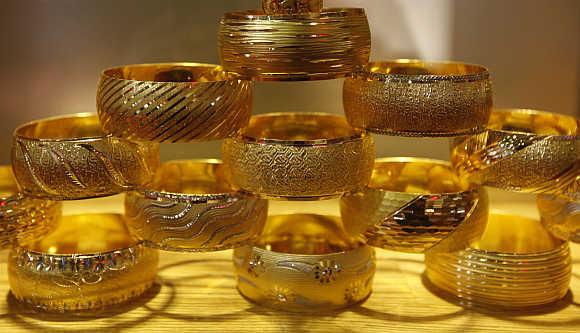
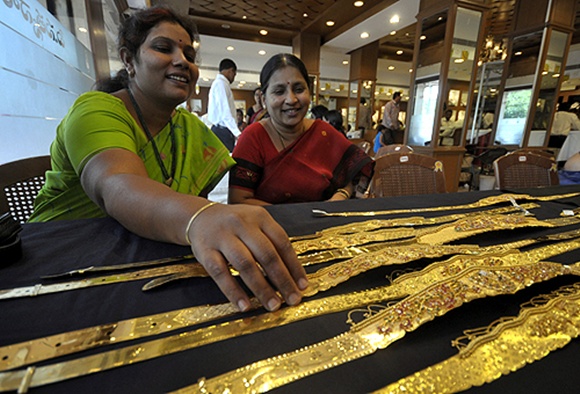
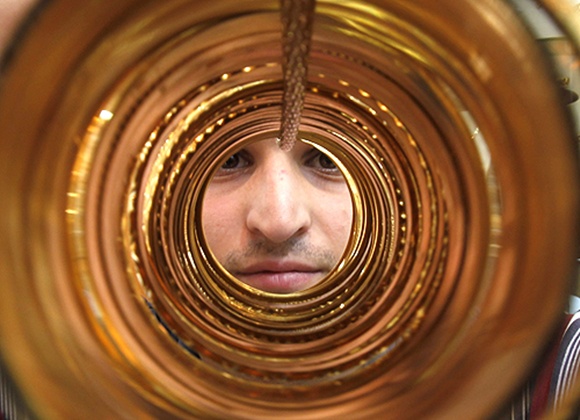
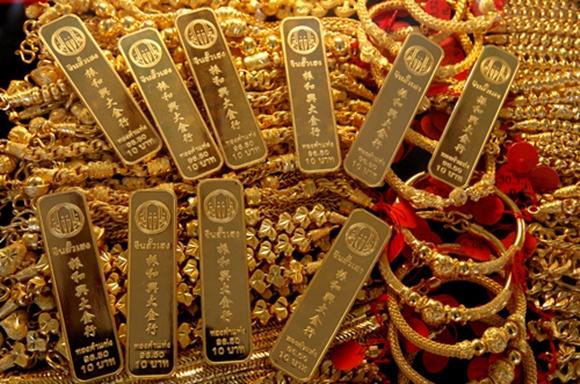
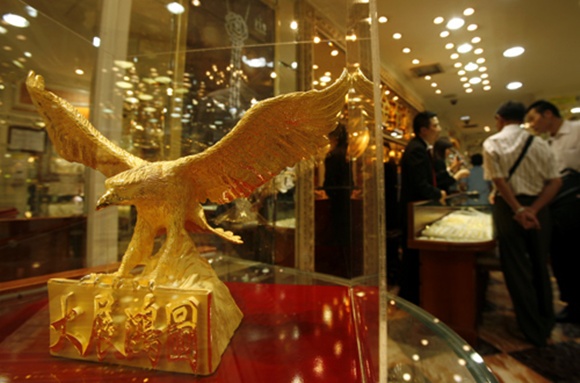
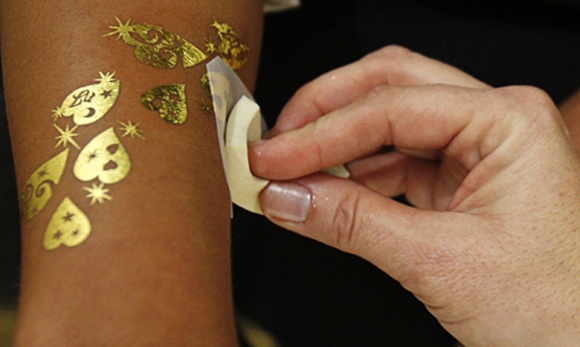

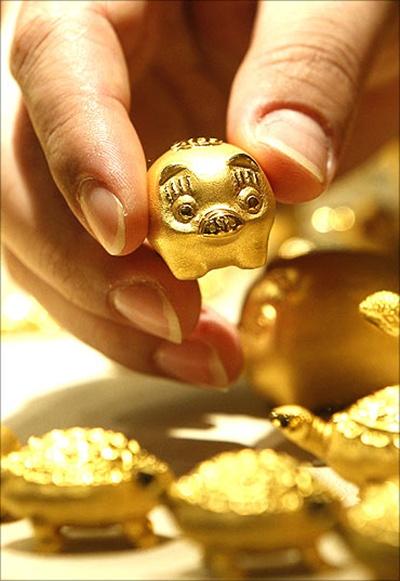


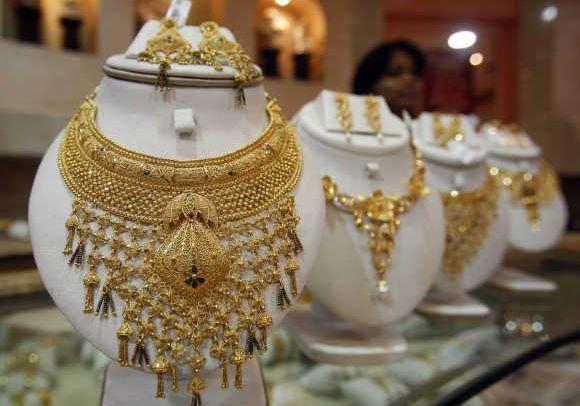

article